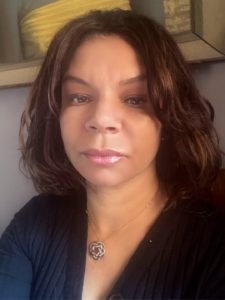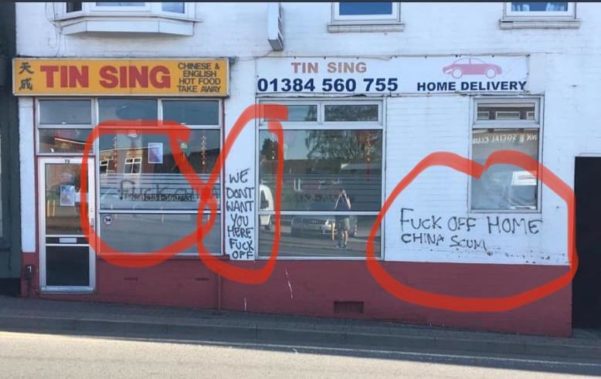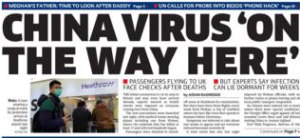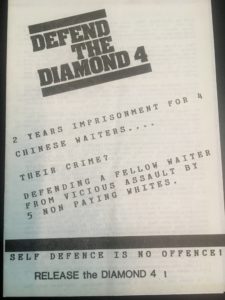In this wide-ranging and disturbing interview, Suresh Grover and Dorothea Jones[1] describe how a combination of Covid-19-linked racism, the ‘Blame China’ narrative and lockdown social distancing measures, are impacting on the caseload of The Monitoring Group; and reflect on the weak responses from the multiple agencies that should be assisting.
Liz Fekete: The Guardian has reported and the government has acknowledged an increase in domestic violence since the Covid-19 lockdown, but the prevalence of race hate crimes has not been acknowledged. Can you explain to us how coronavirus, and now lockdown are impacting on levels of racial violence in London and indeed across the UK?

Suresh Grover: We are witnessing a dramatic rise in racial abuse, harassment and violence (race hate crimes). Since the end of February 2020, calls to The Monitoring Group (TMG) for advice and help have doubled from 140 to 250 and referrals from police and other agencies have sky rocketed from around 20 to 100 cases, if you compare current figures over the last quarter with last year. The call figures resemble the spike during the BREXIT campaign but the number of referrals is unprecedented. These figures relate principally to Greater London. The picture across UK is still unclear for us at the moment, although we are gaining more information from our networks in Southampton, Manchester and York. There are confirmed reports of incidents of serious assaults against Chinese students by large groups of white youth. We are hoping to make a proper assessment within a couple of weeks.
The other indication of its seriousness is the fact that the Metropolitan Police has been compelled to create an online community reference group involving some local Chinese cultural groups across London. Its purpose appears to be to alleviate community concerns on this issue and promote online police messages in Chinese languages to report hate crimes.
L.F.: The Monitoring Group has an online system for reporting racial violence, as well as an emergency help line. Can you explain how that system has held up during the crisis?

Dorothea Jones: The baseline is that TMG will always assist anybody that seeks help. If for some reason we are unable to assist we will always try to signpost. Messages are left on the answerphone (if we are unable to take a phone call) and we endeavour to reach the client within 24 hours. We have a phone system which works remotely and are able to offer support from our homes during lockdown. We have seen an approximate increase of 160% in referrals since 2016/2017 and we fear this will increase further during and post COVID-19.
We have a statement on both our Facebook and Twitter accounts informing the public we are still open to assist clients if they are suffering racial harassment and violence during the lockdown. We are still receiving referrals online daily and we contact as and when they are received. The cases are mainly in London but increasingly we are receiving cases nationwide. We have cases in Manchester, York, Cardiff and Southampton.
L.F.: I would imagine that social distancing measures are presenting huge difficulties?
D.J.: As a caseworker, I am often the first point of contact at TMG for someone who is suffering racial violence. The trauma and urgency displayed by clients after an attack is understandable and occurs often. You are right that the restrictions of the lockdown which began on Monday 23 March have created immense difficulties when dealing with clients. There is no face to face contact which is often so important. The reassurance that happens with human contact cannot be replicated by online meeting platforms like Zoom or Microsoft Teams. In addition, some of our clients do not have access to the internet due to age and socio-economic factors. A phone call can be useful to ascertain the seriousness of the incident and how best to assist, but this is usually the first step when contacting clients. However, at the moment this is vital as it is one of the only communication mechanisms we have. I do not feel I am offering a complete service without face to face client contact. I spend longer on the phone as I think it important to reassure clients when they are so distressed. Also taking in depth statements over the phone takes significantly longer than in person.
The helplessness I experience every day as a caseworker is difficult to explain. Knowing that the police and other agencies that are meant to assist clients will no longer do this because of COVID-19 is soul destroying. Racist incidents/crimes are underreported and my fear is that during the period of COVID-19 and lockdown this will continue and actually worsen. Inevitably this will mean victims of racial harassment will be less likely to report it. The charging and conviction rates for racist crimes are already woefully low. With courts not sitting and police resources directed elsewhere, victims of racism will again be ignored and in many cases, justice not even sought in the first instance.
Clients are even more desperate now when they contact TMG. I have had clients on the phone crying because they have received a call back from us and were not expecting any help and support during lockdown. That’s how dire the frontline situation is.
The other thing I’d like to point out is that social distancing is a privilege. Many of our clients cannot social distance in their everyday lives due to the frontline work they do, their journeys into work or overcrowded accommodation.

L.F.: What sort of patterns in race hate crimes are you discerning – is the racism directed at particular communities?
D.J.: Racism and racial attacks against East Asians have increased significantly. We have had ten referrals in the last few weeks and calls from media outlets as well…
S.G.…There is no doubt that the UK’s Chinese and South East Asian communities are being targeted and the harassment is driven by the ‘Blame China’ narrative fuelled by prominent politicians. The harassment ranges from abuse in supermarkets and Chinese owned Take-away businesses, racist graffiti on shop windows and physical violence on the streets or around international student hostels. Not all the victims are Chinese. We are dealing with a sickening incident in Orpington (Kent) where, for instance, a Japanese person was greeted as Chinese and then deliberately urinated upon – he is one of the many who have become victims of collateral damage under COVID-19.
D.J.: There are other examples. A young student from Singapore was spat at on the underground by a member of the public. She stated nobody came to her assistance although she was shouting for help. Now she is terrified to go out wearing a mask (which is for her protection) because this will make her more of a target for further attacks. So, to ‘protect’ herself she will not go outside without her flatmate. There is ignorance involved in these attacks. The client is from Singapore, the ‘othering’ of East Asians is apparent in the racism they experience as is their perceived link to disease (by racists) and its spread.
Another example, which did get media coverage, was the attack on the young man from Singapore who was beaten up in February by youths who punched him in the face before shouting out ‘coronavirus’. This happened on Oxford Street, one of the busiest streets in the world. The ignorance and stupidity demonstrated by racists is baffling. They viewed the victim as somehow contagious and responsible for spreading disease and yet decided to have physical contact with him. This displays a complete lack of logic and was an irresponsible, violent and heinous attack.
L.F.: What about the experiences of other BAME communities, how have they been impacted?
D.J.: The cases are changing … the language used by perpetrators has become more violent, more personal. ‘Monkey’, ‘Black c**t’ ‘half-caste’ ‘ni**er’ ‘dirty corona spreader’… words reminiscent of 1970s Britain. The attacks have become more frequent. Some clients are starting to see this as a normal part of living in the UK (and have voiced this), in fact ever since the 2016 EU referendum result.
There have been more neighbour-related racist disputes reported. This is often repeat victimisation and frequently the client feels unable to escape. This is of course intensified and magnified because of the lockdown. London is a particular hotspot. Whereas maybe a year or so ago it was easier to identify the hotspots of where racial violence is occurring, it is now much more difficult to pinpoint. There are incidents pan-London. As yet we have not identified a pattern to area reporting but we will begin analysis over the coming weeks.
There have been reports from clients who have been racially abused whilst in open spaces (taking regular permitted exercise) during the lockdown. One of the clients has quite severe mental health problems and since the incident has chosen not to go out as she is so scared of a repeat. A man swore at her, blocked her path and called her a ‘monkey’ This is impacting on her mental health.The daily exercise helped with her health symptoms and now she feels this option is not available to her for fear of attack. The client sobbed on the phone while recounting her experience.
 There has also been a marked increase in key workers and low paid workers experiencing racial abuse and violence since the lockdown. Security guards, police officers, police call handlers and care workers have all sought support from TMG after being racially abused at work. Many have sought support from their employers but have not found it. They not only fear infection from the virus but, as they are frontline workers, they now have to live with the fear of being abused whilst assisting the vulnerable – and coupled with this are often paid a pittance for the privilege! Many are choosing whether to risk infection or risk not being paid at all. That is the stark reality many of our clients face.
There has also been a marked increase in key workers and low paid workers experiencing racial abuse and violence since the lockdown. Security guards, police officers, police call handlers and care workers have all sought support from TMG after being racially abused at work. Many have sought support from their employers but have not found it. They not only fear infection from the virus but, as they are frontline workers, they now have to live with the fear of being abused whilst assisting the vulnerable – and coupled with this are often paid a pittance for the privilege! Many are choosing whether to risk infection or risk not being paid at all. That is the stark reality many of our clients face.
L.F.: Is there a gender aspect to all of this?
S.G.: Our overall data shows that women constitute over half of victims, and some of them are single parents and almost all are on low income. They are targets for harassment because of their race but their gender and class are also used against them. Often, by the time they contact us, they have already accumulated negative experiences and stereotypes from different agencies and are near the end emotionally – having to cope with harassment and provide full parenting responsibilities for their children. Women of colour are acutely aware of the trauma their children may suffer as a family unit even if they are not the prime targets. However, seeking support from professional services can be a double-edged sword as their parenting often becomes the focus of intrusive investigations by social services. These lived experiences have led us to appraise our own delivery of casework. It is no longer simply led by so called experts. Care is taken to involve clients as much as possible to learn from their specific experiences and actively involve them in the whole process from decision-making to finding solutions.
D.J.: Women are racially abused in a pejorative way and there are intersections with their gender. ‘Black bitch’ is such a common racist insult, it is unusual for a client to be abused on her race alone. Older women are being racially abused and even assaulted in front of witnesses who rarely intervene let alone come forward. The ‘angry Black woman’ narrative or the ‘superwoman schema’ is certainly not helping Black women who have been racially abused. The supposition that Black women have super strength is so prevalent when they interact with the police. How is it possible an elderly Black woman can be spat at, racially abused, and hit on a crowded bus in 2020 London and nobody comes to her defence? Not even the bus driver? The police were keen to close this case even though it was so violent but TMG insisted the perpetrator’s photo be shared on social media which it now has been.
L.F.: We know that prior to Covid 19, and particularly with Brexit, but also due to austerity, families and small business around the country were facing repeated racial harassment from neighbours and customers often linked to anti-social behaviour generally. Have the pressure cooker conditions of lockdown intensified that kind of daily racial harassment?
S.G.: The BREXIT campaign ran over years and its full impact, although dramatic at some stages, was felt over time. COVID 19’s timespan has just begun and the trends are just emerging. Nevertheless, they are as worrying. As we’ve been explaining, our work reveals a pattern where vulnerable people of colour – such as lone workers, elderly people or women living on their own – are facing low level acts of daily harassment by known perpetrators whose sole purpose seems to make victims’ lives even more unbearable. We know racism flourishes under different conditions and is not static. In that sense the current lockdown will pose many challenges. The longer it lasts, the more vulnerable people of colour will become — not simply victims of harassment from individuals or social groups, but also of structural racism and disadvantage. It is also possible that we may eventually see a decrease in street led racism if the lockdown measures become more stringent.
D.J.: Let me give you an example of the lived experience of daily harassment by known perpetrators. It relates to a case we are dealing with in Manchester. Our client has been racially abused by neighbours since October. The video and audio have been captured on her CCTV camera. The Housing Association she is with has been supportive and is seeking an eviction notice for the racist tenant. The police have been ineffective and she was worried that the racism would spiral over the Easter weekend. An Asian police officer attended the property a few days ago after the client reported yet another racist incident to the police. The police officer was also racially abused by the perpetrator and still did not arrest him even though he had been called out to a racist incident.
L.F.: Given all we are hearing about the way lockdown is being policed, and how people are being fined for not following social distance guidelines, this is extremely worrying. It seems to indicate that police resources are being diverted away from hate crimes.
D.J.: As far as we are concerned, police had not taken incidents of racial violence seriously pre- COVID-19. Undoubtedly, this failure will be exacerbated during this period. Other examples include trying to close some particularly violent cases without thorough investigation or even support for the client. This has meant us pressuring investigating officers to deal with cases properly. Without assistance from TMG many clients would have invariably seen their cases closed by the police.
L.F.: Turning back to the experiences of East Asian communities, can you give us some idea of the coping mechanisms that they are adopting?
S.G.: Chinese communities have organised virtual and physical support groups in universities and through some community organisations and academics at universities. Some groups already existed on a cultural and academic basis and these infrastructures are being used to disseminate information on racism and how it should be dealt with. However, sometimes the experience of harassment becomes unbearable. A family running a take-way shop often lives above it so they are unable to escape it. Even if it is low level, its perpetual nature can have a traumatic impact on their lives and lead to stress, anxiety, sleepless nights and reliance on medicine. Our research, conducted over the BREXIT period, showed that now only 1 in 10 BAME families now actually report racist incidents to the police, the figure is even lower for the Chinese community. So often, just like other BAME communities, it has begun to rely on its own resilience and self-organised groups.
The experience of racism against the Chinese community is not a new feature in British society. There are reports of race riots targeting Chinese businesses and laundries as early as 1919. We also witnessed a spike in racist incidents against the Chinese community during the ‘Foot & Mouth’ crisis in 2001 due to the unsubstantiated smear that the disease had spread from a Chinese restaurant using illegally imported meat.

Over the last two decades there is real evidence of Chinese groups organising against racism. There have been self-defence campaigns – such as the Diamond 4 – when four waiters were charged with criminal offences despite themselves being victims of racial violence and in central London a series of large-scale restaurant strikes and shut downs in London’s Chinatown due to racist immigration raids and police behaviour. I’d like here to quote a section from our 2009 report Hidden from Public View, which I believe is most relevant to today. We stated then ‘that the Chinese community suffers from levels of racism that are not only unacceptable but also, given the prevalence of under-reporting within the Chinese community, that there are perhaps even higher levels of racial violence or harassment than those experienced by any other minority group. This view is contrary to the established myth of the Chinese being a satisfied community that is immune from racism. Additionally, the lack of adequate reporting in the gathering of official statistics, possibly itself driven by stereotyping, means that the real picture remains unacknowledged. Even when Chinese victims persist in reporting race crimes, including serious offences, they frequently face a response that is shaped by institutional racism – a state of inaction and denial.’
L.F.: What did you feel when Michael Gove made his statement apparently blaming China for the crisis – a theme then taken up by the newspapers?
S.G.: I wasn’t surprised by Gove’s comments – his record of insincerity and hypocrisy is even acknowledged by members of his own Party. Like Trump, he dog whistles to a crowd fully aware of the impact of his announcement and the narrative surrounding it and I was very anxious of what would follow. My own experience of suffering racial violence post-Powell and working in this field makes you acutely aware of its impact in the real world – unfortunately the narrative always leads to more harassment and gives cover and legitimacy to those who wish to cause harm.
L.F.: Finally, can we turn to the question of other agencies working on hate crime. On IRR News we’ve been documenting the massive efforts of organisations working on issues of migrant and asylum rights to ensure that immigration detainees are released and to expose the dangerous and unhealthy conditions in asylum hostels. This showed the strength and unity of purpose within the migrants and asylum rights campaigning sector. But in terms of hate crime, isn’t the Covid 19 crisis doing the opposite – revealing the weaknesses in a sector which is actually quite well-funded?
S.G.: The ‘hate-crime’ network is politically weak, and some groups within it rely on a model that ties them to the state for information, research and sometimes access to the media. Hate crime policies have focused on individualised definitions of racism and identity politics. The IHRA (International Holocaust Remembrance Alliance) definition of antisemitism for instance has contributed to the dismantling of a collective understanding of racism (both here and internationally) and a unified struggle against all forms of racism it in favour of a misconstrued interpretation of victim-centred approaches. This has led to a hollowed out understanding of racism. It is now devoid of any political, social or economic context and priority is afforded to online comments, personal insults – everything is hatred – over structural and institutional forms of racism and lived experience. The tragedy is that despite the fact racially and religiously motivated hate crimes continue to account for over 80% of all recorded hate crimes since the Stephen Lawrence report, Black and Brown experiences have been marginalised and the funding afforded to representative organisations is pitiful – literally crumbs from the table and that sector, like us, is not trusted with core or strategic funding. We are viewed as too grassroots, independent, and uncompromising in our approach to delivering a quality service for victimised communities by using all the legitimate tools at our disposal including campaigns to hold the state to account. As a consequence, the hate crimes forums that have become established are controlled by agencies of the state where Black and Brown presence is marginal and the authorities are rarely, if ever, challenged.
Related Links:
The Monitoring Group website can be found here
If you need to contact The Monitoring Group:
Email office@tmg-uk.org
Tel 020 7582 7438


Please have this issue shown broadly on EVERY DAY news during lockdown.
Thank you for giving this issue some visibility, especially as reports will be low in incidents people experience. I’m from the east midlands and am the Creative Director of Communities Inc, that works to raise awareness of hate crime and encourage bystanders to make simple and safe interventions. We have been approached by Nottinghamshire Police to develop some posters encouraging Asian and Chinese communities to report hate incidents. Its disheartening when the hate mongers find even more creative ways of expressing their hate…..Spitting is emerging as something that is growing that has affected me and others in Leicester and Nottingham! Thank you for all the work you do!
Voilence ,spitting and any distasteful act resulting from being a certain colour or race is totally unacceptable. Ignorance is never an excuse. Interlectually or otherwise. Let’s face it as a Black Man living in England there is institutional racism perpetuated by many of our Asian Brothers & Sisters. I have experienced it first hand at my place of work & where I purchase my food & even in my place of birth Jamaica. My prayer is that this Pandemic leveller will renew the minds of all people of the world and our Leaders as to the futility of hate.